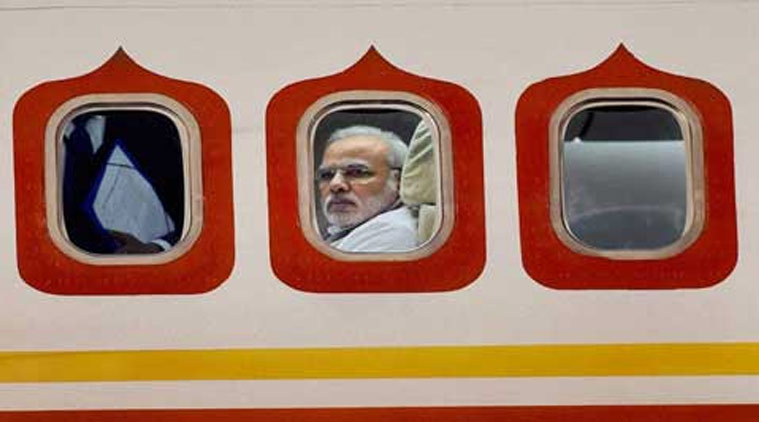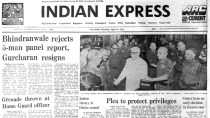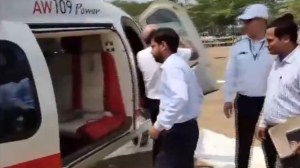- India
- International
When Central Asia calls
If Russia and China enter, compete and succeed in the region, can India afford to lag behind?
 Modi is a popularly elected leader while all his counterparts in Central Asian countries, save Kyrgyzstan, are leaders with strong communist antecedents.
Modi is a popularly elected leader while all his counterparts in Central Asian countries, save Kyrgyzstan, are leaders with strong communist antecedents.
By paying official visits to five Central Asian countries plus Russia within the span of a week, Prime Minister Narendra Modi surpassed his predecessors and put Eurasia firmly in India’s zone of interest. This July visit has allayed fears that Central Asia is of secondary importance
to India and will go down in the annals of India-Eurasia relations as a red-letter visit. The array of issues Modi discussed with Central Asian leaders, the bilateral declarations and pledges they jointly made in press conferences, the mutual agreements signed and the camaraderie he has developed during his maiden visit are testimony to his initial success in Central Asia. Significantly, Modi met the Central Asian leaders twice within a week — first in their respective capitals for delegation-level talks and then at Ufa in Russia during the Shanghai Cooperation Organisation (SCO) summit. A telling achievement is the beginning of the process of India’s inclusion in this regional grouping as a full member.
There was a discernible mismatch between the Indian leader and his Central Asian counterparts. Modi is a popularly elected leader while all his counterparts in Central Asian countries, save Kyrgyzstan, are leaders with strong communist antecedents. Islam Karimov of Uzbekistan and Nursultan Nazarbayev of Kazakhstan run countries that are rich in oil, gas and uranium. Both leaders are communists turned democrats and have survived the wrath of time since achieving independence in 1991. Both are astute politicians and adroit diplomats. They have entwined their survival instinct with populist measures by prioritising security and stability. They have strictly regulated economic activity. But this freedom is freedom for a few, and suffering for the masses.
Kyrgyzstan is the only country in Central Asia that has come through two revolutions — the tulips to dethrone the first president in February 2005 and another in 2010 to depose Kurmanbek Bakiyev. Since then, it has shifted to a parliamentary form of governance. A poor country, it has been grappling with problems, sandwiched between US and Russian interests. Geopolitics has crowded out economic
interests. However, this is the one country in Central Asia that upholds the principle of liberal democracy.
The penultimate stop in Modi’s tour was Turkmenistan, a gas-rich country that was ruthlessly ruled by its first president, Saparmurat Niyazov. He transformed Ashgabat into a glistening marble city and emphasised the development of the oil and gas industry. Inspired by the ideals of non-alignment, he followed positive neutrality as the cornerstone of his foreign policy, but allowed the Taliban to use his government’s resorts on the Caspian Sea. His successor, Gurbanguly Berdymukhamedov, has continued his predecessor’s policies. This is the country from where two major pipelines to India are planned. Modi must address the pending issues of the pipelines.
Tajikistan was embroiled in a civil war between 1992 and 1997. Since then, an alliance between old communists, neoliberal democrats and Islamists has held power, headed by Emomali Rahmon. Close to Afghanistan and Pakistan, Tajikistan is an unstable country. Here, Indian geopolitical interests intersect with the rest of Central Asia’s, as all countries have a stake in Tajikistan’s stability.

India has four major interests in Central Asia: security, energy, trade and mutual cooperation in various realms. Modi does not wish to help the Central Asians build democracy, as do the Americans, but has commerce in mind and is well aware that security and stability are indispensable for trade and development. Throughout his visit, he asserted that we had common interests, our issues were common, our heritage was common, and the space had historically been common. He has called for the issues of terrorism, narcotics trafficking and arms smuggling to be addressed with determination.
Energy security is of utmost importance. Kazakhstan, Turkmenistan and Uzbekistan are endowed with enormous hydrocarbon reserves.
Two of these countries — Kazakhstan and Turkmenistan — are in the Caspian littoral, thereby promising to open the door to other energy-rich Caspian states. Connectivity through the North-South Transport Corridor featured in Modi’s speeches in both countries as much as the impending implementation of the two gas pipelines. These are implementable but hinge on the political situation in Pakistan and Afghanistan.
Regional security cooperation is inherently linked to economic development in Central and South Asian countries and
energy security, in turn, is dependent on regional stability. Therefore, Modi’s discussions with individual Central Asian leaders as well as within the SCO will have crucial bearing on the future. Without security, development becomes fuzzy, and development is Modi’s mantra.
There is a vast scope for furthering bilateral ties in education and English-language teaching from schools to universities, healthcare, tourism, agriculture and agro-processing industries, pharmaceuticals and drug manufacturing, textiles, petrochemicals, mining, military cooperation and cadre-training, and other allied fields. Cooperation in the field of uranium extraction is unfolding with Kazakhstan, Uzbekistan and Tajikistan. If Russia and China enter, compete and succeed in Central Asia, can India afford to lag behind?
The writer, former ICCR India Chair, University of World Economy and Diplomacy, Tashkent, Uzbekistan, is author of ‘India and Central Asia: Two Decades of Transition’
EXPRESS OPINION
More Explained
Apr 26: Latest News
- 01
- 02
- 03
- 04
- 05










































